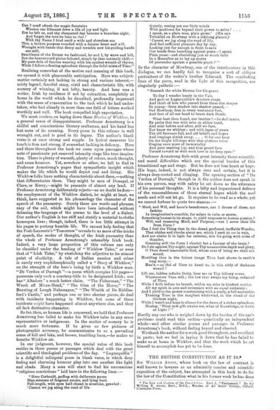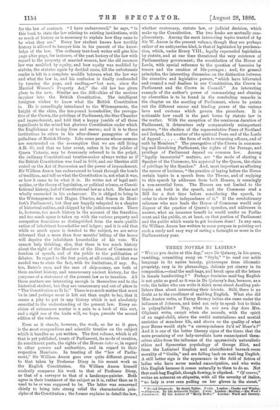THE BRITISH CONSTITUTION AS IT IS.* SIR WILLIAM ANSON, whose
book on the law of contract is well known to lawyers as an admirably concise and scientific exposition of the subject, has attempted in this book to do for the law of the Constitution what in his former work he has done
• The Law and Custom of the ConpUt.tion. Part L, "Parliament." By William R. Anson, Bart., D.C.L , Warden of All Souls' College, Oitord. Clarendon Press.
for the law of contract. " I have endeavoured," he says, " in this book to state the law relating to existing institutions, with so much of history as is necessary to explain how they came to be what they are." Every law student knows how terribly history is allowed to hamper him in his pursuit of the know- ledge of the law. The ordinary text-book writer will give him page after page, for instance, of the past history of the law with regard to the property of married women, how the old common law was modified by equity, and how equity was modified by statute, the statutes again by decided cases, till the unfortunate reader is left in a complete muddle between what the law was and what the law is, and his confusion is finally confounded by turning the page, and reading,—" but now, since the Married Women's Property Act," the old law has given place to the new. Similar are the difficulties of the anxious inquirer into the British Constitution. The intelligent foreigner wishes to know what the British Constitution is. He is accordingly introduced to the Witenagemote, the knight of the shire, the ten-pound householder, the preroga- tive of the Crown, the privilege of Parliament, the Star Chamber and impeachment, and told that a happy jumble of all these ingredients is the mixed but glorious Constitution under which the Englishman of to-day lives and moves ; and it is to these institutions he refers in his after-dinner panegyrics of the palladium of British liberty. Like some parsons whose sermons are constructed on the assumption that we are still living A.D. 30, and that no later event, unless it be the jubilee of Queen Victoria, may be decorously referred to in the pulpit, the ordinary Constitutional treatise-maker always writes as if the British Constitution was fixed in 1688, and our liberties still rested on the Act of Succession and the power of impeachment. Sir William Anson has endeavoured to break through the bonds of tradition, and tell us what the Constitution is, not what it was, or how it came to be what it is. He writes not of legal anti- quities, or the theory of legislation, or political science, or Consti- tutional history, but of Constitutional law as a fact. He has not wholly succeeded in his endeavour. He is obliged to bring in the Witenagemote and Magna Charter, and Simon de Mont- fort's Parliament ; but they are happily relegated to a chapter of historical outline, and skipped by the judicious reader. There is, however, too much history in the account of the franchise, and too much space is taken up with the various property and occupation franchises as distinguished from the main qualifi- cation of inhabitant householder and lodger ; and it is odd that while so much space is devoted to the subject, we are never informed that a more than four months' letting of the house will deprive the inhabitant householder of his vote. We cannot help thinking, also, that there is too much history about the right of the Members of the House of Commons to freedom of speech, and of the public to the publication of debates. In regard to the first point, at all events, all that was needed was to state the fact, with its limitations, if any. So, too, Bates's case, and the case of ship-money, are both of them ancient history, and unnecessary ancient history, for the purposes of a statement of the present law as to taxation. All those matters are interesting enough in themselves and to the historical student, but they are unnecessary and out of place in " The Constitution as It Is." There is so much matter that must be in (and perhaps more is left out than ought to be), that it seems a pity to put in any history which is not absolutely essential to the understanding of the present law. Every ex- cision of extraneous matter is a gain to a book of this sort, and a rigid use of the knife will, we hope, precede the second edition of the volume.
Even as it stands, however, the work, so far as it goes, is the most compendious and scientific treatise on the subject which it handles as yet written. The first volume, which is all that is yet published, treats of Parliament, its mode of creation, its constituent parts, the rights of the Houses inter se, in regard to other powers and authorities, and in regard to their respective Members. In treating of the "law of Parlia- ment," Sir William Anson goes over quite different ground to that taken by Professor Dicey in his recent work on the English Constitution. Sir William Anson himself modestly compares his work to that of Professor Dicey, as that of a surveyor to that of a landscape-painter. Both agree in their treatment of the subject as it is, rather than as it used to be or was supposed to be. The latter was concerned chiefly to bring into strong relief the characteristic prin- ciples of the Constitution ; the former explains in detail the law, whether customary, statute law, or judicial decision, which make up the Constitution. The two books are mutually com- plementary. Among the most interesting topics treated of by Sir W. Anson in the present volume, though they are perhaps rather of an antiquarian kind, is that of legislation by proclama- tion, which, under Henry VIII., legally superseded legislation by statute, and at one time threatened the very existence of Parliamentary government; the constitution of the House of Lords, with special reference to the question of baronies by tenure and the creation of life-peerages ; and, for general principles, the interesting discussion on the distinction between the executive and legislative powers, " which have bifurcated and created a real dualism in our Constitution, the Crown in Parliament and the Crown in Council." An interesting example of the author's power of summarising and clearing up obscurities is to be found in the concluding remarks in the chapter on the meeting of Parliament, where he points out the different source and binding power of the various laws and customs which govern the procedure. It is noticeable how small is the part borne by statute law in the matter. With the exception of the maximum duration of Parliament, it determines only comparatively unimportant matters, " the election of the representative Peers of Scotland and Ireland, the number of the spiritual Peers and of the Lords of Appeal the form of writ to returning officers, and of oath by Members." The prerogative of the Crown in summon- ing and dissolving Parliament, the rights of the Peerage, and privilege of Parliament depend on common law. Among "legally immaterial" matters, are "the mode of electing a Speaker of the Commons, his approval by the Queen, the claim of privilege by the Speaker." And, most important as affecting the course of business, "the practice of laying before the House certain topics in a speech from the Throne, and of replying to this speech by addresses from both Houses, is seemingly a non-essential form. The Houses are not limited to the topics set forth in the speech, and the Commons read a Bill for a first time before considering the speech, in order to show their independence of it." If the revolutionary reformer who now leads the House of Commons would only dispose of the practice of Queen's speeches, and addresses in answer, what an immense benefit he would confer on Parlia- ment and the public, or, at least, on that portion of Parliament and the public which wants to get business done l In any case, Sir William Anson has written to some purpose in pointing out such a ready and easy way of saving a fortnight or more in the Parliamentary year.



































 Previous page
Previous page